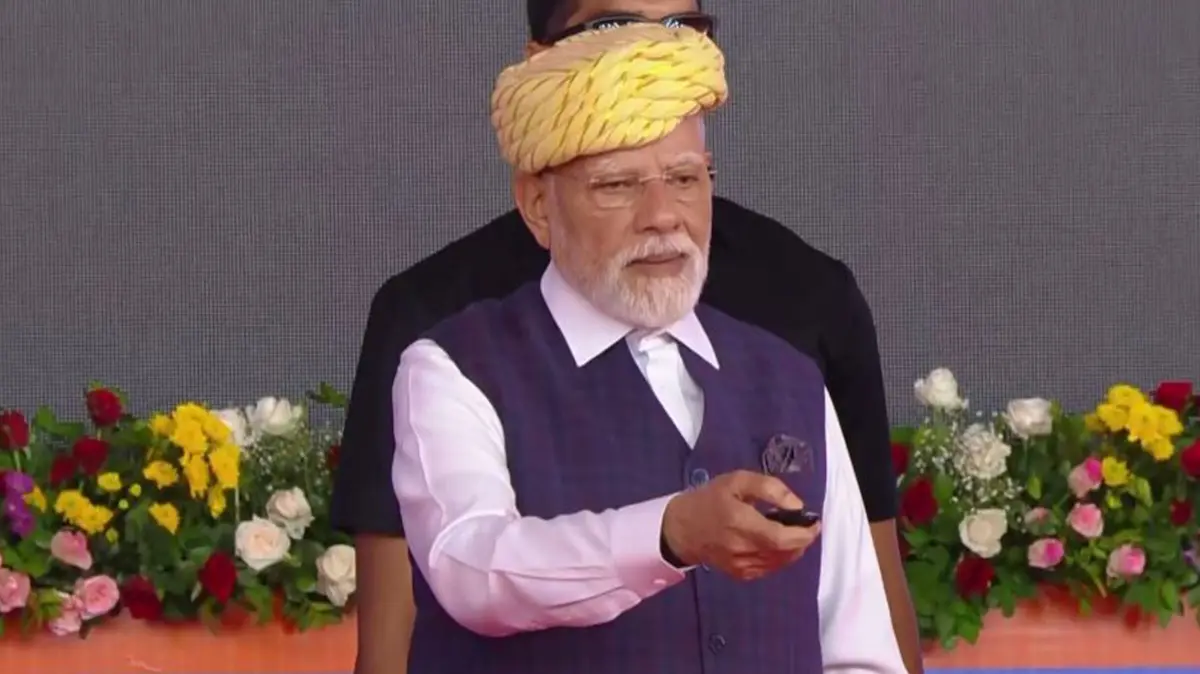
Where Modi’s Self-Reliance Push Begins: Bhavnagar’s Role in India’s Economic Shift (photo - videograb)
What Modi’s Bold Statement on “Dependence” means for India’s future – Prime Minister Narendra Modi made headlines with a powerful statement: “India’s biggest enemy is dependence on other countries.” His words came during a public address in Bhavnagar, Gujarat, just as the United States imposed steep tariffs on Indian imports and raised the H-1B visa fee to an unprecedented $100,000.
This wasn’t just a speech, it was a call to action. Modi’s message was clear: India must become self-reliant, or risk compromising its future, pride, and global standing.
Why Modi Called “Dependence” India’s Biggest Enemy
Modi’s Bold Statement on “Dependence” – Modi’s statement wasn’t just rhetoric, it was rooted in growing global tensions. The U.S. government, under President Donald Trump, recently announced:
- A 50% tariff on Indian imports, citing geopolitical concerns
- A $100,000 annual fee for H-1B visa applications, which will hit Indian professionals the hardest
These moves have raised alarms in India’s tech and trade sectors. Modi responded not with retaliation, but with introspection. He said:
“We have no major enemy in the world. Our only real enemy is our dependence on other countries. This is our biggest enemy, and together we must defeat it.”
He emphasized that India’s reliance on foreign nations whether for semiconductors, shipping, or skilled labour, makes the country vulnerable to external decisions. And when those decisions are unilateral, India’s economy and dignity suffer.
Also read: Why Modi’s ₹34,200 Crore Maritime Projects Could Transform India’s Economic Future
How Foreign Dependence Hurts India’s Economy and Self-Respect
Modi’s remarks were backed by hard numbers and historical context. Consider these facts:
| Sector | Current Dependence | Impact on India |
| Shipping | ₹6 lakh crore spent annually on foreign ships | Nearly equal to India’s defense budget |
| Semiconductors | 90% imported from abroad | Limits tech sovereignty and innovation |
| H-1B Workforce | 71% of H-1B visa holders are Indian | Vulnerable to U.S. policy shifts |
| Trade | High reliance on imported goods | Weakens domestic manufacturing and job creation |
Modi linked this dependence to a deeper issue: national pride. He said:
“If we remain dependent on others, our self-respect will be hurt. We cannot leave the future of 1.4 billion countrymen to others.”
He also criticized past governments for entangling India in the “license-quota raj” and failing to build a strong industrial base during globalization.
What India Is Doing to Become Self-Reliant (Atmanirbhar)
Modi’s speech wasn’t just about problems, it was about solutions. He outlined a roadmap for Atmanirbhar Bharat (Self-Reliant India), including:
- Infrastructure Recognition for Shipbuilding: Large ships now classified as infrastructure, making financing easier
- “Chip to Ship” Manufacturing Push: India must produce everything from semiconductors to ships domestically
- Simplified Trade Laws: Repealing colonial-era regulations and streamlining port processes
- Massive Investment: ₹34,200 crore worth of development projects launched in Gujarat, including ports, cruise terminals, and renewable energy hubs
These initiatives aim to reduce foreign dependence, create jobs, and empower local industries. Modi declared:
“There is only one medicine for a hundred sorrows, and that is a self-reliant India.”
When Global Pressure Meets Local Resolve: Citizens React
The timing of Modi’s statement just after the U.S. visa and tariff announcements was no coincidence. It reflected India’s growing frustration with being treated as a secondary player in global economics.
Citizens and experts have responded with mixed emotions:
- Tech professionals fear losing access to U.S. jobs due to visa hikes
- Exporters worry about reduced competitiveness in American markets
- Entrepreneurs see opportunity in Modi’s push for domestic manufacturing
- Youth feel inspired by the call to build India’s future with their own hands
Modi’s emotional appeal resonated deeply. He interacted with children, invoked cultural pride, and reminded the nation that self-reliance is not just economic, it’s spiritual.
“Chip ho ya ship ho, hume Bharat mein hi banane honge.” (Whether it’s chips or ships, we must make them in India)
Final Thoughts: What’s Next for India’s Global Role?
Modi’s message is clear: India must stop outsourcing its future. Whether it’s technology, trade, or talent, the country must build its own capabilities and stand tall on the world stage.
The U.S. tariffs and visa fees may be temporary, but the lesson is permanent. Dependence is dangerous. And self-reliance is the only path to dignity, prosperity, and peace. As India approaches its 100th year of independence in 2047, the question isn’t whether it can become Atmanirbhar, it’s whether it dares to.
Stay informed with the latest news and updates – only on Rapido Updates.